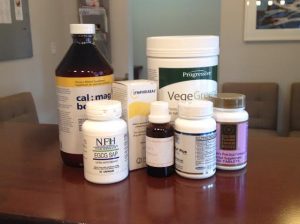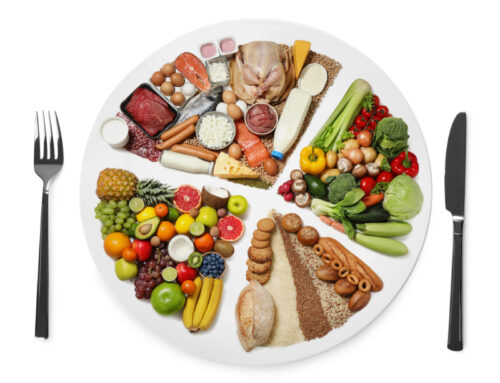Question: Why do Naturopathic Doctors recommend professional supplements when other brands are sooooo much cheaper and have similar ingredients!?
By Kathleen Regan, ND
On days where I don’t practice as a naturopath, I consult at a law firm on medical files. Last week I walked into the staff room to find a group of lawyers standing around talking about the price of supplements. I got a lot of questions put to me directly about the cost, quality and regulation of supplements. These are questions that patients might not be comfortable asking… in so many words. Nobody asks questions as directly as a lawyer!! So I thought I might pick a few of them and provide some answers.
 How is all of this regulated anyways? Is there quality control in place for the natural supplement industry?
How is all of this regulated anyways? Is there quality control in place for the natural supplement industry? - Why do you recommend such expensive professional products?!
- Is there really a difference in quality or is this just a scheme to make money?
- Are there certain supplements that you should buy from a ‘better’ company and others that you can get on the cheap?
- What products or details do you pay special attention to when recommending a brand?
How is all of this regulated anyways? Certainly our government must have quality control in place for the natural supplement industry?
**WARNING: the answer to this question can be very boring! Skip down below for products to pay special attention to …**
In the regulatory vacuum of the North American dietary supplement industry, quality control has always been a concern. In the USA, dietary supplements are barely regulated, and anything can be sold without much in the way of safety analysis before putting it on the market.
In Canada, however, formal regulatory requirements for the manufacture of dietary supplements have been issued by the new Natural Health Products Directorate (NHPD). All NHPs sold in Canada are subject to the Natural Health Products Regulations which came into force on January 1, 2004. All products must have a product licence and Canadian sites that manufacture, package, label and import these products must have site licences.
To obtain these licences, specific labelling and packaging requirements must be met, good manufacturing practices must be followed, and proper safety and efficacy evidence must be provided.
The licensing requirements apply to any person or company that manufactures, packages, labels and/or imports NHPs for commerical sale in Canada. They do not apply to healthcare practitioners who compound products (AKA herbal teas, powders or tinctures) on an individual basis for their patients, or to retailers of NHPs.
Since pharmaceuticals are considered to be potentially more dangerous, pharmaceuticals require strict purity testing procedures and results and rigorous manufacturing standards that range from cleanliness of the working area and the equipment used, to facility design to minimize contamination, to testing for identity, active ingredients (potency), purity, solvent residue, heavy metal contamination and microbial contamination. As such, pharmaceutically synthesized products actually tend to have few to no contaminants and unknown ingredients compared to naturally sourced herbs. Pharmaceutical protocols demand that all variables are controlled. In Canada, the NHPD is moving towards enforcing such rigorous testing of natural health products, which improves their safety and efficacy.
This means that the NHPD screens for safety and efficacy of the natural supplementation industry. In addition to this, a natural supplement company cannot make health claims on its label unless these statements have been proven in scientific evidence. However, currently this agency does not currently test for contamination, active ingredients, purity, heavy metal or microbial contamination (although it looks like things may be moving in this direction). This is particularly relevant given recent concern over impurity, contamination, heavy metal toxicity and products which contain cheaper and completely different herbs than represented on labels.
See this CBC article: Herbal product contamination ‘considerable,’ DNA tests find (http://www.cbc.ca/news/health/herbal-product-contamination-considerable-dna-tests-find-1.1959278)
In addition to this, the NHPD only considers binders and additives as they pertain to human safety – NOT as they pertain to efficient digestion and absorption.
For example, Magnesium stearate is often used as an anti-adherent in the manufacture of medical tablets, capsules and powders because of its lubricating properties. This prevents ingredients from sticking to manufacturing equipment during the compression of chemical powders into solid tablets. Studies have shown that magnesium stearate may affect the release time of the active ingredients in tablets. This product is quite safe for human consumption however, it can affect the way a supplements works. This is very important to naturopaths, especially when considering individual transit time in individuals with deficiency or poor absorption.
Furthermore, a company is not required to indicate any products used to stabilize a supplement from its raw form before it reaches the manufacturer. And manufactures can source products in raw form or in processed form but this is not necessarily indicated on the label.
For example, ‘Vitamin C’ can be either pure ascorbic acid or 90% ascorbic acid with 10% corn starch and lactose. ‘Vitamin D’ can be pure Vitamin D or Vitamin D in a dilution of dicalcium phosphate, lactose, BHT, sodium benzoate and so on. Pepsin, commonly found in digestive enzymes can be pure pepsin or pepsin standardized with lactose.
Why do you recommend such expensive professional products when other brands are cheaper with similar ingredients?
Professional companies go above and beyond the NHPD regulation in terms of quality control and innovation.
Quality Control:
- Certain companies have their own manufacturing facility or in-house laboratories.
- Certain companies source pure raw materials as opposed to standardized raw materials (as described above OR companies purchase standardized/stabilized materials bound to highly absorbable substances rendering them more bioavailable.
- Certain companies have full label disclosure, including non-medicinals; standardizations of herbal extracts to indicate primary active marker compounds; and minerals are listed by true elemental weight
- Certain companies have independent testing in addition to NHPD regulations. They have in-house laboratories or third party assessment that validate the quality, stability, potency and purity of the products from manufacturing, to preparation, bottling and storage.
- Certain companies re-test the raw materials and finished product for purity or contamination (and are able to provide these reports).
- Certain companies ensure that their ingredients are optimized for digestion and absorption.
Innovation:
- Professional companies often have a team of doctors and/or scientists that formulate products based on the known literature or traditional use of a vitamin, mineral or herb. This includes consideration of the most potent substances and proper dosage. These products are made with purpose and intention for certain medical conditions and optimal absorption.
Is there really a difference in quality or is this just a scheme to make money?
Professional products cost more to make and therefore cost more to purchase. The wholesale value is more expensive than cheaper brands. This is due to the expense of having a professional formulation team, a cleanly and environmentally responsible facility, in-house or third party quality control, and the purchase of pure raw material or higher quality standardized raw material. The true difference is quality and innovation with formulations that a naturopathic doctor can trust.
Naturopaths are often dealing with food sensitivities, systemic inflammation and immune-compromised individuals who are sensitive to the quality and efficacy of supplement products. In any chronic condition or disease it is important to make sure that we are working with products that will not further aggravate an individual as can happen with contaminated products or products that contain unlabeled substances. These products must also be absorbable, bioavailable and at the right dosage. We wish to ensure that if a patient is willing to invest in their health that their product can achieve results. Otherwise, it is just expensive urine.
Are there certain supplements that you should buy from a ‘better’ company and others that you can get on the cheap?
This is a tricky question and a very good one. Myself, I am not familiar with all the details of the raw material and manufacturing industry. I wish I had the time. However, the supplement industry is huge and the variables are numerous. I can tell you that I personally avoid cheaper brands. I find that they upset my stomach and do not achieve the same results. However, when a person is grossly deficient and on a tight budget some supplementation is better than none. There are some products that I worry about more than others and I tend to encourage purchasing a better brand. These include herbal products, probiotics, fish oils and fat-soluble vitamins.
What products or details do you pay special attention to when recommending a brand?
Herbal products: Herbal products are notorious for cross contamination. Adulteration with toxic herbs and frank substitution is a problem in the industry. Plus, the potency and dosages for medical effectiveness is often not considered. We source our herbal products from a local supplier or from reputable companies.
**Good Read: Herbal product contamination ‘considerable,’ DNA tests find (http://www.cbc.ca/news/health/herbal-product-contamination-considerable-dna-tests-find-1.1959278)**
Probiotics: The nature of live bacterial cultures is growth and change. By their very nature probiotics are subject to change and growth of bacteria not on the labels. There have been numerous studies on this issue.
**Good Read: Quality of Probiotic Supplements Questioned (http://www.bastyrcenter.org/content/view/664/)**
Fish Oil Supplements: Solvents and heavy metals are a reality in the ocean. We have the technology to eliminate these toxins from fish oils. Fish oil MUST be tested for impurities after processing and should be subject to batch testing.
**Good Read: Polychlorinated biphenyls, hexachlorobenzene, hexachlorocyclohexane isomers, and pesticide organochlorine residues in cod-liver oil dietary supplements (http://www.ncbi.nlm.nih.gov/pubmed/15330552)**
**Good Read: Safety Consideration with Omega-3 Fatty Acid Therapy (http://www.sciencedirect.com/science/article/pii/S0002914906022387)**
Fat Soluble Vitamins: It is hard to find fat soluble vitamins such as D or K, that are not diluted with substances such as lactose, cornstarch, and preservatives such as BHT. This might not be a problem for all patients but it should be considered. Furthermore, fat soluble vitamins and any oil-based product are best absorbed with other fats. Overconsumption of one fat product can affect the absorption of another Ex, Vitamin D and E. And addition of other vitamins and minerals can influence fat absorption. There is tremendous interplay between fat-soluble vitamins that we are only beginning to appreciate. This is where intelligent product formulation is essential.
Good Read: Nutritional Adjuncts to Fat Soluble Vitamins (http://www.westonaprice.org/fat-soluble-activators/nutritional-adjuncts-to-the-fat-soluble-vitamins)
Chinese Patent Formulas: There has been concern with heavy metal and toxin content of Chinese patents. Many of the NHP product warnings arise from patents. It is very important here to buy from a reputable source.
Binders and Fillers: As discussed with the magnesium stearate, certain binders/fillers are not well absorbed. The herbal contamination article by CBC ( above) also discussed that many products contain fillers not identified on the labels. Furthermore, several products contained rice, soybean and grasses such as wheat that could pose a health concern for people allergic to those plants and for consumers seeking gluten-free products.
Absorbability and Bioavailability: I like to make sure that all other vitamins and minerals are absorbable and bioavailable. This could be an article on its own. But one example is iron supplements. Ionic iron sources such as ferrous fumarate (most commonly prescribed by conventional doctors) are generally poorly absorbed and poorly tolerated. A heme iron source in the form of a polypeptide is the best absorbed followed by more absorbable/tolerated ionic iron sources such as carbonyl iron. Absorbability and bioavailability is often considered by a professional company and their formulation team.
Dosage: Professional brands have professional formulation with dosages that meet medical needs based on recommended daily allowance and medical research. Many other brands often contain inappropriate dosages that are ineffective.





